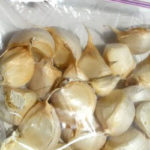Foods That Should Never Be Frozen
1 Nuts
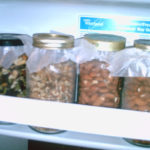
Although cooler temperatures can help to preserve the natural oils that are found in nuts, lower temperatures may also have a negative impact on their flavor. Like bread and butter, ideally, you should store nuts at room temperature.
If you do have a surplus supply of nuts that you will not be able to use within a few days, you can freeze them. However, they may not taste quite as nice as they would fresh.
2 Onions
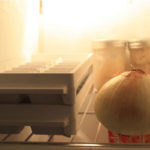
Ideally, you should store uncut onions in a cool, dark place. Many people store them in the fridge, but this can do more harm than good. The cold, damp conditions make the onions go soggy and ultimately spoil them.
If you do have an uncut onion that you need to store, place it in a sealed container and put it in the fridge for a maximum of three days.
3 Beer

If you want to get your beer cold quickly, you should never opt for the freezer. Of course, you should not let beer in the freezer for a long time, the bottle won’t resist the cold. But it’s not a good idea for a short period of time either!
Putting a beer in the freezer will impact the quality of the taste. Why? Because the cold accelerates the aging of the liquid and will make your beverage flat and hazy.
4 Potatoes
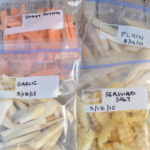
You’ll often find pre-cooked and mashed potatoes stored in the freezer, and that’s just fine. However, raw potatoes simply cannot sustain very low temperatures.
Again, the main issue here is water content. When raw potatoes are frozen, the change in structure results in nothing short of mush that not many people would be interested in eating. Save yourself the trouble.
5 Garlic
Garlic will last longer when it is stored at room temperature than it will when frozen or refrigerated. The moisture in the air of cooling appliances will cause the garlic to deteriorate.
As such, it is better to store it in a cool, dry, and dark environment. Ideally, you should leave the bulbs intact before use.
6 Olive oil

Olive oils are another example of food items that will degrade as a result of being exposed to cold temperatures. Refrigerated oils will become grainy and cloudy, while room-temperature oils will maintain their rich color and stability.
Once again, the best option for olive oils is to store them in a cool, dark environment such as a larder or kitchen cupboard. You wouldn’t the expensive olive oil you purchased at the market go bad, would you?
7 Spices
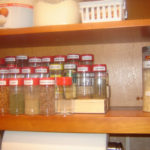
Like dried fruit, dried spices don’t need to be refrigerated. Simply store them in a cool and dark environment away from high temperatures.
Take a look at the spices you have in stock on a regular basis to ensure that they are not past their use-by date.
8 Pasta

While eating pasta that has been cooked, frozen, and thawed certainly won’t kill you, it won’t exactly be the most pleasant culinary experience either.
Pasta that is frozen will become very soft and unpleasant to eat. If you eat your Al Dente pasta, frozen pasta will not have a texture you will like. Try it once to know our claim is true.
9 Peanut butter
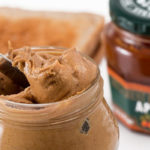
Like syrup, there is absolutely no need to store processed peanut butter in the fridge or freezer and doing so will just make your life hard work—there’s nothing worse than trying to spread a thick solid layer of peanut butter on a slice of toast!
The situation changes somewhat when it comes to natural peanut butter. While the spread itself may last longer when it is kept in a cool environment, the oils will separate, and the basic structure of the spread will change. Ideally, you should store the spread at room temperature and consume it within six-eight months.
10 Gravy
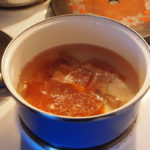
Gravy is another food that really shouldn’t be frozen. While doing so certainly won’t cause any major harm, it will change the consistency of the gravy and cause the fat and water to separate.
The reality is that gravy simply doesn’t store well at all. You can refrigerate it for 24 hours; alternatively, just eat a lot!
11 Dried fruit
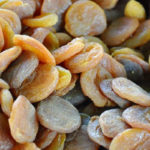
Dried fruit has had all its moisture removed as a means of preserving it. There is no need to place it in a fridge or freezer. Doing so will only reintroduce moisture and ruin the fruit.
Place dried food in a cold, dark, and cool area, preferably in an air-tight container. If stored in the right conditions, dried fruit can last for six months without the need for refrigeration.
12 Canned food
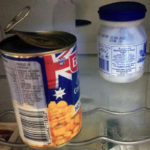
Never place canned food in the freezer. One of the main reasons for this is that canned food items contain a large amount of water that will expand when frozen.
What’s more, the whole objective of placing food in air-tight cans is to preserve it; no further action is needed. We’ll add that opened canned food presents a risk for your health; you shouldn’t leave food in an opened can for more than a few hours, no matter if you freeze it or not.
13 Butter
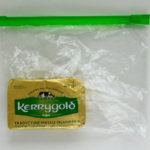
Butter can be difficult enough to spread without freezing it first. Ideally, you should cut a small amount of butter from the slab and store it at room temperature.
However, if the weather is particularly hot, store it in the fridge. Don’t be tempted to freeze it; there is no need to do so.
14 Syrup
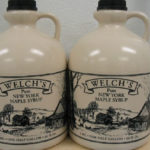
Syrup is typically made from high amounts of sugar. As such, it contains preservatives that will enable it to last for a few months without being refrigerated.
While many households do opt to store syrup in the freezer, this is completely unnecessary and will simply mean your syrup becomes stiff and difficult to pour. Keep it in the fridge if you must.
15 Chocolate
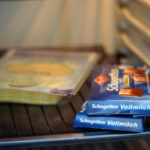
There may be nothing worse than spoiled chocolate. If you have a surplus supply of chocolate, don’t be tempted to stick it in the fridge or freezer to keep it fresh. The excess moisture in cooling appliances will change the texture, color, and shape of the chocolate for good.
What’s more, chocolate can absorb odors from the surrounding environment, so you should avoid storing it in close proximity to aromatic food items. The best place for chocolate is in an air-tight container in a cool, dark place.
16 Soy sauce
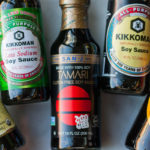
Soy sauce is often labelled with storage instructions that state it is safe for refrigeration, yet you’ll seldom come across a cold bottle of soy sauce in a restaurant.
Refrigerating soy sauce is completely unnecessary because it contains a high volume of salt, which acts as a natural preservative. In fact, you can store an opened bottle of soy sauce for up to six months at room temperature and even more if you are willing to take a gamble. Gotta use that health insurance you just got yourself, right? We’re kidding, of course. But seriously, we bet you’ve had soy sauce that’s been sitting in a cupboard for longer than six months already. Yet you are here reading this. You can now claim to be an old soy sauce survivor.
17 Eggs
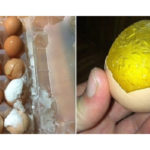
Never freeze eggs that are still in the shell. Again, the main issue here is water content. When water freezes, it increases in volume, and this will fracture the shell and render its contents susceptible to bacteria.
If you do need to freeze some eggs to prolong the freshness, crack them open, scramble them, and place them in the freezer in an airtight container.
18 Ketchup
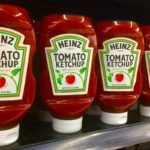
While you may keep your ketchup in the fridge (despite the fact it is shelf-stable at room temperature), you definitely do not need to freeze it. In fact, you shouldn’t.
If ketchup is frozen, the tomatoes separate from the vinegar and water, creating unpalatable gunge. Even college kids don’t make this mistake.
19 Coffee
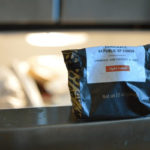
Much as you may like to keep ground coffee fresh, you should avoid freezing them or placing them in the fridge at all costs. Why? Because ground coffee is a major absorbent, and it will literally extract anything it can from the surrounding environment, including odors, tastes, and moisture.
You can try to avoid this by placing the grounds in an air-tight container. However, most storage containers are not entirely air-tight, and the end result is slightly damp grounds that are far from fresh. We know you want the energy boost associated with your coffee, but you certainly don’t want an unwanted sketchy taste with that, do you?
20 Bread
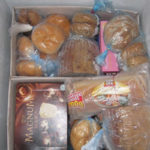
Many of us stick a loaf of bread in the freezer every now and again. However, if there’s a chance you will use the full loaf within a few days, store it in a room-temperature environment. Cold temperatures change the basic structure of bread, causing it to taste stale once thawed.
However, if you have a loaf that is on the verge of going stale, you can stick it in the freezer provided you plan to toast it before eating it. You’ll thus avoid throwing it out and will save money with this trick instead.
21 Defrosted meat

Once you have defrosted uncooked meat, you should never put it back in the freezer. Foods that have been frozen and then thawed are ultra attractive to harmful bacteria.
If you do need to refreeze meat that has been previously frozen, cook it first to ensure that any lurking bacteria have been eliminated. You don’t want to use your medical insurance for an error that is so easily avoidable.
